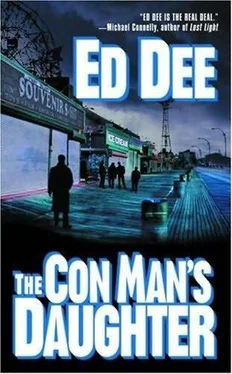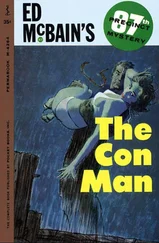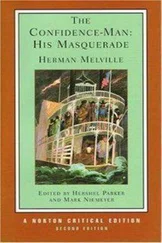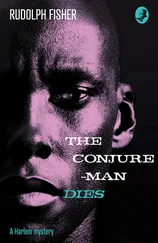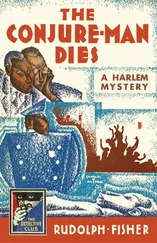"Eddie, listen to me for a second. Let's let Matty Boland know about this. God knows I hate the prick, but we need a backup here."
"That's why I'm asking you."
"But think about the consequences. Say, for whatever reason, Zina goes totally ballistic and it's just me and you."
"That's the way I want it," he said. "That's the big, big favor."
"And if you're wrong?"
"Then I kill her," he said.
"Jesus," she said, looking up at the original tin ceiling of an Irish bar that had seen better days. "And you have the balls to call me melodramatic."
Thursday, April 16
10:10 A.M.
On the morning of the tenth day, Eddie Dunne sat on the hood of Kate's Toyota, looking up at his house and waiting for Detective Babsie Panko. His body, which had never let him down before, now shouted messages of surrender to his brain. His left forearm was still swollen, the stiffness in his fingers getting worse. But even if he had time, he wouldn't go to the hospital; they'd just sling it and hand him a painkiller. A few years earlier, he'd broken the radial bone in his elbow while sliding headfirst into third base in a bar league's softball game. It felt like that again. Nothing broken ever heals completely.
He'd been waiting for Babsie for almost an hour. She'd worked into the night on Zina's Visa card and phone bills. Then, a little after 7:00 a.m., she ran out the door, saying she wanted to talk to the DA in White Plains. Not a word from her since, and they needed to get moving soon if they were going to have time to visit the Sheepshead Bay Marina. For a woman who grew up a mile from the Bronx, Babsie didn't have a clue about how long it took to get around the city in the middle of a weekday.
With the warmth of the spring sun boring through the trees, Eddie could recall the sight of Eileen at her kitchen window, singing in that thin soprano common to churchwomen. As a young girl in cuffed jeans and tight pink sweaters, the former Eileen McGuire sang the words to every doo-wop song by the Dell Vikings, the Dell Satins, or any of the street-corner wonders of the fifties. Somewhere along the way, the joy diminished and the hymns and the sadness engulfed her. It was no secret that she considered the life choices of her husband to be more than she could bear. In the end, she sang the same sad stanzas over and over, without realizing she was doing it.
With a screech of rubber, Babsie's Crown Vic came around the hedges and barreled up the driveway. She looked frazzled, her hair wild. Eddie made the mistake of looking at his watch.
"Just get in the car," she said.
"We don't have time for the marina."
"We have time. Get in."
Eddie insisted on taking his car. He had his reasons. The Yonkers Police Department's Crown Vic had no official markings, but it looked so much like a police car, it might as well have had the bubblegum lights on the roof. Then he whispered to her that he didn't want to use her city-owned car to transport the money. Using his car would give weight to her "story" in case his plan went sour.
"As far as I'm concerned," he said, "you don't know anything about the bag in my trunk. Whatever I do will be a complete surprise to you."
"Let me see this fake boodle," she said, sighing theatrically as she grabbed her cell phone, notes, and camera and shoved them in her purse.
Eddie opened the Toyota's trunk and unzipped a blue canvas duffel bag. Babsie whistled, then picked up what appeared to be a tall stack of older hundred-dollar bills. She held it between her thumb and fingers, fanning the ends with her other thumb.
"This might work," she said. "How did you get them wrapped so tight?"
"Kevin and I used to deliver advertising flyers; the machine is still in the basement of the bar. It cuts, wraps, and binds stacks of paper with this reinforced wire ribbon. You need heavy-duty scissors to cut these bindings."
Babsie began the trip in silence, rearranging her purse. Eddie told her the rawness in his tongue had eased, toughened from a night's reprieve of scraping across a cracked tooth. Then he explained the layout of Jimmy's Bistro, particularly the parking lot. He said he thought he'd be able to approach Zina outside, if Babsie could flash her identification and pull Mrs. Borodenko aside for a few minutes. This would give him time to show Zina his good faith, now bundled tightly in the trunk. The next move would be hers. Babsie nodded, as if to say, Whatever you want.
"I called Celltech this morning," she said.
"You didn't use your nurse connection?" Eddie asked.
"It wouldn't have worked. They never give out information on DNA tests without a court order."
"What DNA tests?"
"That's what I'm getting a court order to find out," she said. "We know that Zina submitted two samples for comparison, but they won't tell us the names without a court order."
"What's the basis for the order?"
"We have reasonable cause to believe that evidence regarding our homicide victim, Paul Caruso, is in the possession of Celltech labs."
Eddie knew the circumstances surrounding the murder of Paul Caruso gave them the legal footing for the court order. A torn photo, similar to one recently removed from the residence of said Paul Caruso, had been found in a premises under the control of Zina Rabinovich, the individual who had submitted the DNA for testing. Ms. Rabinovich was known to have criminal ties to the alleged murderer, Sergei Zhukov, who was in Sicily at the time Mr. Caruso and the photo disappeared. It wasn't a tremendous reach.
"At this point," Babsie said, "we know Zina submitted a VNTR pattern request. That's a parent-child pattern analysis to determine paternity. If one sample turns out to be Paulie's, then it's evidence in a murder investigation."
"How soon will they know?"
"Couple of hours, at most. Our people already completed Paulie's pattern, to back up the dental record identification. Soon as the court order is signed, Celltech can compare the two. How the hell long could that take?"
"If it is Paulie, fatherhood or not, it links Zina directly to his murder."
'Then she's a collar," Babsie said. "So take your best shot at her today."
Toby Davis, the caretaker of the Sheepshead Bay Marina, knew Eddie Dunne the moment he walked through the door. Although his eyes were failing, the grizzled old sailor, who'd won a Purple Heart at Iwo Jima, said Eddie's name before the door closed behind him. Mr. Eddie. Eddie introduced Babsie as a friend. Babsie corrected him, emphasizing she was a detective investigating the murder of Paul Caruso. It surprised Eddie that Toby didn't mention his daughter, but the old man probably never knew his last name. Paul Caruso had owned the boat, rented the slip, paid all the bills.
"Shame about your partner," Toby said. "But he lived a lot longer than I ever thought he would. His momma raised one insane child."
Babsie showed Toby the picture of Paul Caruso, Eddie, and Lana standing in front of the Bright Star . Toby held it up close to his face. He knew the guys, he said, but he didn't recognize the woman. Eddie didn't know whether he was being discreet or honest.
'Toby didn't think much of us as sailors," Eddie said.
"Sailors?" he said. "You two wouldn't make a pimple on a sailor's ass. When the Bright Star left the dock, I had to put the Coast Guard on alert. Every night, I went home thinking, Tonight's the night those crazy sons a bitches gonna burn down my marina."
"One fire and you're an arsonist," Eddie said.
"On my dock, miss. They start a bonfire on a wooden dock. Now what the hell kind of senseless boys do that?"
Babsie asked the old man what ever happened to Paul Caruso's boat. He didn't have to look in the file. Toby remembered boats, not blondes.
Читать дальше
